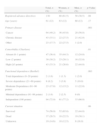To evaluate the characteristics of patients who provide written advance directives and the use of the documents in healthcare practice.
MethodologyAn observational, descriptive, retrospective study of all written advance directives registered at a university hospital between 2001 and 2011. The clinical–demographic characteristics of the patients at the time they provided the documents were studied, as was the later use of the documents through an electronic medical history analysis.
ResultsA total of 130 advance directive documents were registered. At the time of their provision, the average patient age was 61 years; about 64% were diagnosed with a neoplastic illness; 73% were completely independent (Barthel), and 36.4% presented no comorbidities (Charlson). The women were slightly older than the men (63 vs. 60, p=0.17) and they were more likely to provide advance directives (61.5% vs. 31.5%, p=0.01) than men; the women's illnesses were less relevant (p=0.001) and they presented less comorbidity (p=0.01). A total of 361 medical acts were reviewed (193 hospital admissions and 168 emergency visits). At the end of the study, 74 patients were alive (57%), 37 had died (28%), and in 19 cases (15%), their evolution was lost. Of those who died, 13 (35.1%) were functionally incapacitated in the terminal phase of their illness, and in 9 (69%), the advance directives were applied in the final phase of their illness.
ConclusionsThe number of registered advance directives is low; they do not interfere in the care process, and the documents are considered in the final decisions of life.
Evaluar las características de los pacientes que otorgan documentos de voluntades anticipadas (DVA) y su uso en la práctica asistencial.
MetodologíaEstudio observacional, descriptivo, retrospectivo, de todos los DVA registrados en un hospital universitario en el periodo 2001-2011. Se investigaron las características clínico-demográficas de los pacientes en el momento de su otorgamiento y, mediante el análisis de la historia clínica (HC) electrónica, el uso posterior de los DVA.
ResultadosSe registraron 130 DVA. En el momento de su otorgamiento, la edad media era 61 años, un 64% estaba diagnosticado de enfermedad neoplásica, un 73% era totalmente independiente (Barthel) y un 36,4% no presentaba comorbilidad (Charlson). Las mujeres tenían, respecto a los hombres, una edad ligeramente superior (63 vs. 60, p=0,17), otorgaban en mayor medida (61,5% vs. 31,5%, p=0,08), su enfermedad era menos relevante (p=0,001) y presentaban una menor comorbilidad (p=0,01). Se revisaron 361 actos médicos (193 ingresos hospitalarios y 168 visitas a urgencias). Al finalizar el estudio, 74 pacientes estaban vivos (57%), 37 habían fallecido (28%) y en 19 casos (15%) se había perdido su evolución. De los fallecidos, 13 (35,1%) presentaban incapacidad de decisión en la fase terminal de su enfermedad y en 9 (69%) se realizaron uso y referencia expresa a los DVA en la fase final de su enfermedad.
ConclusionesEl número de DVA registrados es escaso; no interfieren en la práctica asistencial y los mismos son considerados en la toma de decisiones al final de la vida.
Article
Diríjase desde aquí a la web de la >>>FESEMI<<< e inicie sesión mediante el formulario que se encuentra en la barra superior, pulsando sobre el candado.

Una vez autentificado, en la misma web de FESEMI, en el menú superior, elija la opción deseada.

>>>FESEMI<<<









